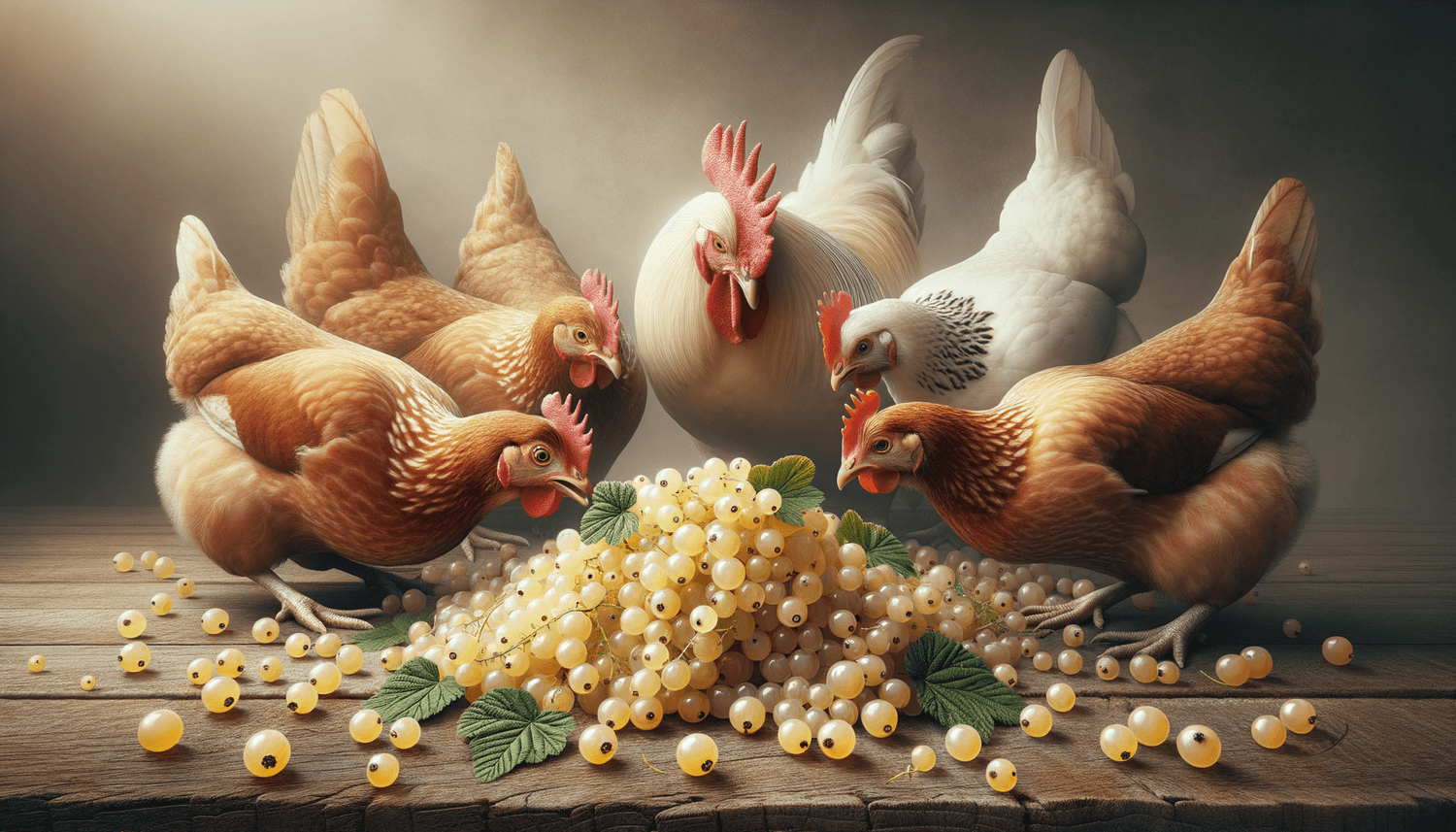Ever looked at plump, juicy white currants and wondered if your sassy backyard chickens would love to nibble on them? You’re in the right place, my fellow chicken enthusiast! In this blog post, we’ll answer the age-old question: “Can chickens eat white currants?” 🐔 We’ll discuss the importance of providing your clucky companions with a balanced diet, dive into the nutritional value of these succulent berries, and explore the benefits and risks of treating your feathery friends to white currants. Lastly, we’ll share some mouthwatering tips on how to prepare this fruity feast for your chatty chicks to devour. Let’s cluck to it!
Can chickens eat white currants?
Yes, chickens can indeed eat white currants, and it is safe for them to do so. These delicious berries are packed with vitamins and nutrients that are beneficial to your feathered friends. However, it’s important to remember that white currants should be offered as a treat and not as a primary food source, ensuring that your chickens maintain a balanced and healthy diet.
Chickens need a balanced diet too!
Just like our own nutrition, chickens require a balanced diet to stay healthy, strong, and productive. A chicken’s diet should primarily consist of high-quality chicken feed, which is specifically formulated to provide the essential nutrients they need to thrive. Chicken feed should make up around 80-90% of their diet, ensuring they get the right balance of proteins, fats, vitamins, and minerals.
As for the remaining 10-20% of their diet, it’s here that you can introduce some tasty treats for your clucky companions! This can include a variety of fruits and vegetables, which not only offer additional vitamins and minerals, but also provide enrichment and excitement for your feathery friends. Remember, though, to always prioritize chicken feed as the main component of their diet to ensure optimal health and happiness for your backyard flock.
Nutritional value of white currants for chickens.
White currants offer several nutritional benefits to chickens when given as a treat. These small, juicy berries are packed with vitamins, like vitamin C and vitamin K. Vitamin C helps to support a strong immune system, keeping your chicken healthy and less susceptible to common diseases. Vitamin K plays a crucial role in blood clotting and maintaining overall bone health, ensuring your chickens maintain strong beaks, feathers, and talons.
In addition to vitamins, white currants are also rich in minerals such as potassium and magnesium. Potassium is essential for proper muscle function, nerve transmission, and fluid balance, while magnesium contributes to a healthy metabolism, strong bones, and optimal egg production. The hydrating nature of white currants can also be beneficial to your flock, especially during hot summer days, as it helps to keep your chickens well-hydrated and prevent dehydration-induced health problems.
Nutrition table of white currants for chickens.
| Information | Description |
|---|---|
| Nutritional Value | Rich in vitamins C and K, as well as minerals like potassium and magnesium. |
| Suggested Serving Size | Small amounts as treats, making up only about 10-20% of their diet |
| Safe Feeding Practices | Ensure white currants are fresh, clean, and pesticide-free before feeding to chickens |
| Preparation | Rinse the berries thoroughly and chop into smaller pieces if necessary |
| Potential Risks | Overfeeding can lead to an imbalanced diet and nutritional deficiencies |
| Hydration | White currants have a high water content, which can help keep chickens hydrated |
| Digestion | White currants are easily digestible, as long as they are given in moderation |
| Seasonal Availability | Typically available during the summer months |
| Other Benefits | Offer enrichment and excitement for your backyard flock |
Preparing white currants for your chickens
Before treating your chickens to some scrumptious white currants, it’s essential to follow a few simple steps to ensure their safety and enjoyment. Begin by thoroughly rinsing the white currants to remove any dirt, grime or pesticide residues. If you have larger berries or young chicks in your flock, you can chop the white currants into smaller pieces to make it easier for your chickens to consume them. Finally, make sure you only provide fresh, ripe and clean berries to your chickens, as moldy, rotten or overly fermented fruits can be harmful to their health.
Other delicious treats for your chickens
White currants aren’t the only delightful treat you can offer your backyard buddies. Chickens love a wide variety of fruits and vegetables, and incorporating different options into their treat time can provide them with plenty of excitement and nutritional benefits. Here are a few other popular options:
- Blueberries
- Strawberries
- Grapes
- Watermelon
- Carrots
- Bananas
- Broccoli
Always ensure you’re introducing new treats gradually and keeping an eye on your chickens’ overall health when incorporating new foods into their diet.
Final thoughts
In summary, white currants make for a safe and nutritious treat for your chickens when fed in moderation. By carefully preparing and feeding white currants to your flock, along with other healthy treats and a well-balanced diet, you can keep your feathered friends happy, healthy, and well-nourished. Happy clucking!

















